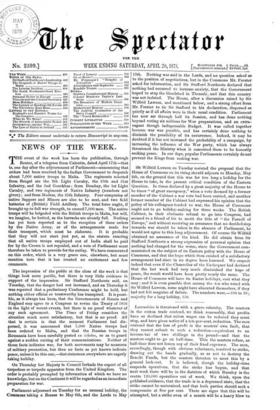Str Wilfrid Lawson on Tuesday resisted the proposal that the
House of Commons on its rising should adjourn to Monday, May 6th, on the ground that this was far too long a holiday for the House to take, in the present critical condition of the Eastern Question. In times declared by a great majority of the House to be times "of great emergency," when a vote deemed by a former member of the Cabinet a war vote had been carried, and another former member of the Cabinet had expressed his opinion that the policy of his colleagues tended to war, the House of Commons ought not to go holiday-making for three weeks. The British Cabinet, in their obstinate refusal to go into Congress, had seemed to a friend of his to merit the title of "the Parnell of Europe," and without receiving an assurance that no decided step towards war should be taken in the absence of Parliament, he would not agree to this long adjournment. Of course Sir Wilfrid obtained no assurance of the kind. He did obtain from Sir Stafford Northcote a strong expression of personal opinion that nothing had changed for the worse, since the Government com- municated on the subject of its Eastern policy with the House of Commons, and that the hope which then existed of a satisfactory arrangement had since in no degree been lessened. We suspect indeed that even if the Chancellor of the Exchequer had declared that the last week had very much diminished the hope of peace, the result would have been pretty nearly the same. The House of Commons will have its Easter holidays, cost what they may ; and it is even possible that among the ten who voted with Sir Wilfrid Lawson, some might have absented themselves, if they had not felt sanguine of failure. The numbers were,-168 to 10; majority for a long holiday, 158.


































